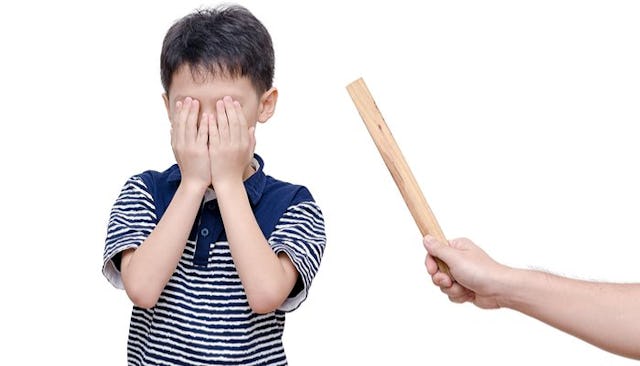It's Way Past Time To Ban Corporal Punishment In Schools

I went to elementary school in a small town until I was 10 years old. I remember kids occasionally getting into trouble for being disruptive and being sent to the principal’s office, which was The Worst Punishment. I also remember the questions other kids always asked feverishly when the kid came back, questions like “Did you get paddled?” or “How many whacks did you get?”
It felt wrong to me then, and it feels even more wrong to me now. My youngest son will be 8 years old this month, the same age of the kids being paddled by the principal in my elementary school. I cannot begin to fathom a school administrator hitting my baby boy with a piece of wood on any part of his body, much less his bottom. We don’t even spank at home. I didn’t grow up in a spanking household, so the idea of whacking a child’s butt feels weird to me. But to have it happen at school? Hells to the nope.
Since I live in a state where it’s illegal, I assumed corporal punishment in schools was a relic of the past everywhere, seen as a misguided and outdated practice that is so obviously wrong, no one would seriously allow it anymore.
Apparently I was wrong.
Twenty-two states in total still allow corporal punishment in schools. Fifteen expressly allow it, and seven have no rules prohibiting it.
And lest you think that it’s allowed but that schools don’t use it, according to the U.S. Department of Education’s Civil Rights Data Collection, 166,807 students were physically punished in schools during the 2011–12 school year.
According to the National Association of School Psychologists (link opens a .pdf), corporal punishment is defined as “the intentional infliction of pain or discomfort and/or the use of physical force upon a student with the intention of causing the student to experience bodily pain so as to correct or punish the student’s behavior.”
The American Academy of Pediatrics has been recommending for years that corporal punishment be abolished by law in all states because such tactics “may affect adversely a student’s self-image and school achievement and that it may contribute to disruptive and violent student behavior.”
And does it even do any good? I don’t see how it could be any more effective than when parents spank, which has been proven to be an ineffective form of discipline. I know I didn’t behave well in school just because I was afraid of being whacked with a paddle. I behaved because I’d been taught to behave, and I respected my teachers.
Kids who don’t learn good behavior at home have to learn it at school, but beating it into them is definitely not the way to go about that.
Studies have also shown that minorities are disproportionately affected by corporal punishment. According to the Brookings Institution, black children are twice as likely to be physically punished as white children. One reason for that is because there is a higher black population in the seven states that account for 80% of corporal punishment incidents (Mississippi, Texas, Alabama, Arkansas, Georgia, Tennessee, and Oklahoma). But even within those states, black children are disproportionately beaten.
Students with disabilities are also more likely to be on the receiving end of physical discipline, according to a report from the ACLU.
Yes, by all means, let’s beat the kids who are already struggling.
Who thinks this is a good idea?
U.S. Education Secretary John B. King Jr. has recently called for all states to abolish corporal punishment, pointing out that “the very acts of corporal punishment that are permissible when applied to children in schools under some state laws would be prohibited as criminal assault and battery when applied to adults in the community in those very same states.”
We’ll see if the 22 states that still haven’t outlawed corporal punishment will listen.
Schools should be safe and welcoming for all students, a place where children learn academic, social, and behavioral skills. When behavior problems arise, beating kids into submission is not an appropriate or effective means of teaching them. We have other, better means, and we need to use them.
As King wrote in his letter, “This practice has no place in the public schools of a modern nation that plays such an essential role in the advancement and protection of civil and human rights.”
It’s well past time to hang up the paddles, stop resorting to violence against children, and invite school discipline practices into the 21st century.